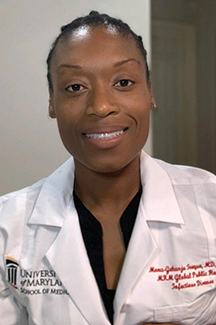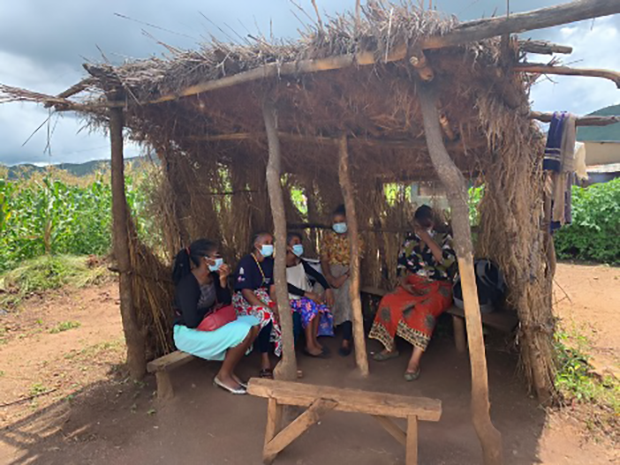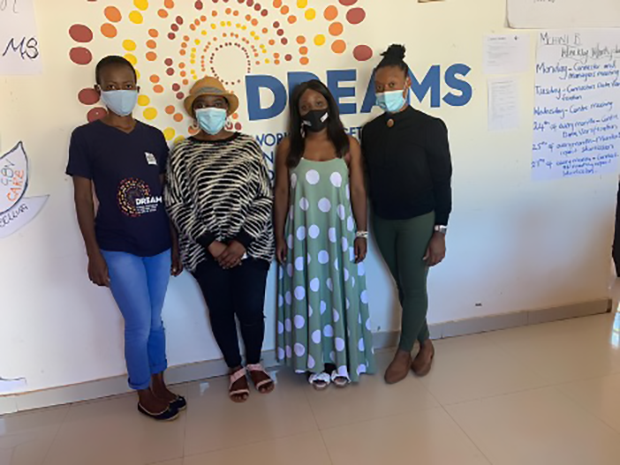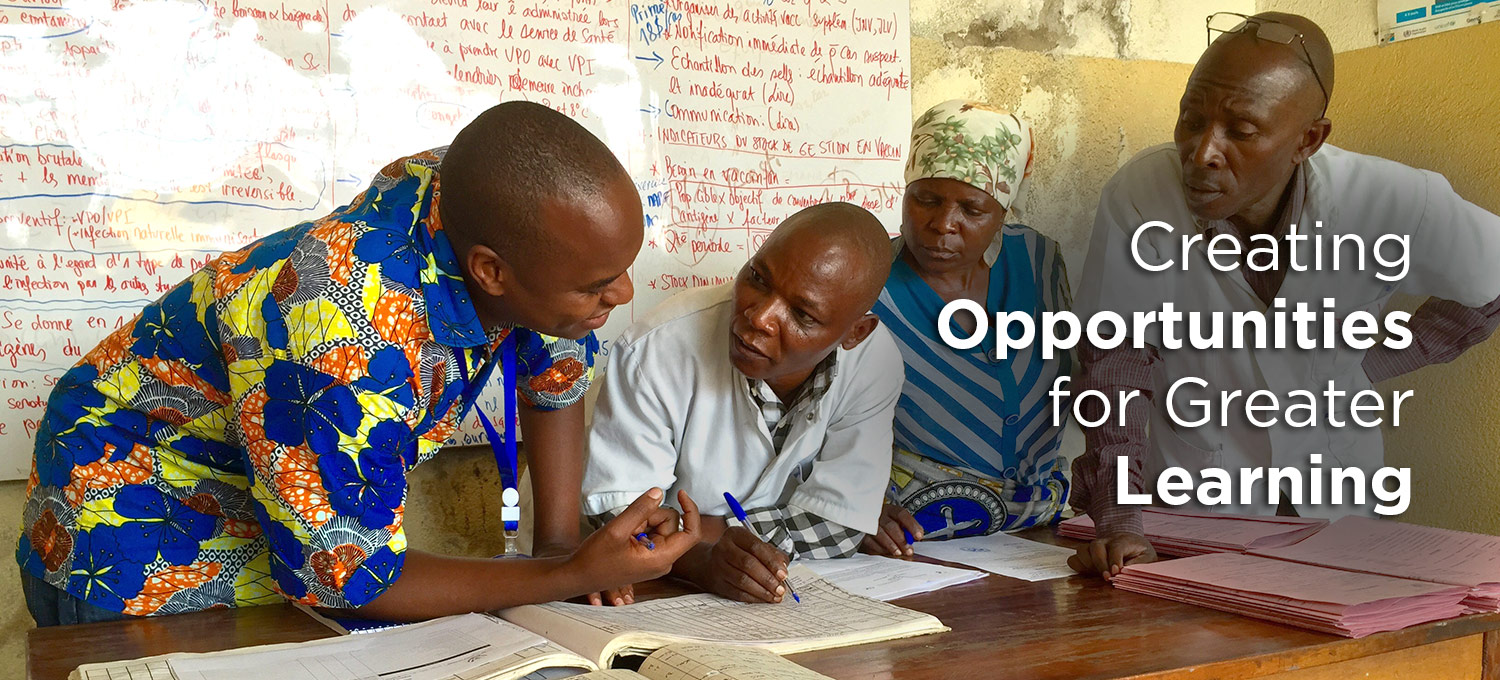MKM Fellow Rises to Public Health Challenges in Zambia
 As the first recipient of the Maeve Kennedy McKean (MKM) Global Public Health Fellowship, Mona-Gekanju Toeque, MD, MPH, has been involved in patient management at the University Teaching Hospital in Lusaka, Zambia. In addition to participating in a wide range of clinical activities, from diagnosing and treating common and atypical disease presentation, she is providing regular COVID-19 updates to UMB and Ciheb Zambia staff in the area of technical support by building capacity among the staff in understanding COVID-19 infection prevention.
As the first recipient of the Maeve Kennedy McKean (MKM) Global Public Health Fellowship, Mona-Gekanju Toeque, MD, MPH, has been involved in patient management at the University Teaching Hospital in Lusaka, Zambia. In addition to participating in a wide range of clinical activities, from diagnosing and treating common and atypical disease presentation, she is providing regular COVID-19 updates to UMB and Ciheb Zambia staff in the area of technical support by building capacity among the staff in understanding COVID-19 infection prevention.
Though it has been approximately seven months since she began her fellowship, Dr. Toeque indicates that she has already developed a much deeper understanding of the public health and clinical challenges facing populations in low-resource countries such as Zambia.
“Many times you may not have the diagnostics due to out-of-pocket cost to the patient for some services or they may not be able to afford the medications versus lack of availability, and alternatives have to be sought that are appropriate in managing the patients effectively,” she explains.
Other challenges include being able to overcome language and cultural barriers to obtain a patient’s history.
She recently was presented with a patient being managed for multidrug-resistant Pseudomonas putida meningitis, a unique clinical presentation typically associated with a history of trauma, soil or water exposure, or neurosurgical procedures. This case was exceptional in that neither the patient nor his family could provide a history of any procedure or other trauma that would have led to the condition. “So the question is, how did he get the pseudomonas without any trauma?” she explains. It is a question that will require further investigation.

Team members at the Mchini DREAMS center safe space location in Chipata, Eastern Province.
Assisting Adolescent Girls and Young Women
Beyond her clinical responsibilities, Dr. Toeque has also taken on teaching and research immersion as part of Ciheb’s education programs. “I have had a plethora of opportunities to get involved with over the seven months,” she said. “I’m really grateful for that.”
Dr. Toeque recently visited three new DREAMS centers in Zambia’s Eastern Province. The centers only opened late last year, and Dr. Toeque has been working under the supervision of Dr. Cassidy Claassen, assistant professor of medicine and technical director/chief of party of CIRKUITS, on grantsmanship and programmatic aspects of the CIRKUITS project, which is part of Ciheb.
DREAMS — which stands for determined, resilient, empowered, AIDS-free, mentored, and safe — is a global, public-private partnership that was launched in 2014 on World AIDS Days to empower adolescent girls and young women and reduce HIV risks, while strengthening families and mobilizing communities to reduce gender-based violence by providing safe spaces, counseling, and other interventions. Among its objectives, DREAMS seeks to reduce new HIV infections in adolescent girls and young women between 10-24 years in Zambia and nine other sub-Saharan African countries.
During her visit, Dr. Toeque observed a sensitization session conducted in a DREAMS safe space in Mchini in the Chipata District among a group of young girls. The subject was HIV, sexual health, and safe sex. Dr. Toeque was impressed that the girls were forthcoming and engaged despite the hardships they had endured. “The fact that they were asking questions showed that they were listening and picking up points,” Dr. Toeque said. “It was such a great experience to see these girls — they are underserved, mostly married at young ages, some pregnant at very young ages.”

Team members at the Mchini DREAMS center in Chipata, Eastern Province. Dr. Toeque stands on the right.
HIV Research
A third component of Dr. Toeque’s work in Zambia involves research that centers on the treatment of HIV, specifically on how drug regimens impact health outcomes. In Zambia, people living with HIV are typically treated on a first-line, second-line, and third-line progressive drug regimen based on immunological, virological, and clinical status. The third-line regimen, which is prescribed when the second line fails, often includes drugs with higher barriers to resistance and is used when treatment is beyond antiretroviral therapy providers’ reach. Dr. Toeque has been investigating the outcomes, tolerability, and symptoms of patients on a third-line regimen. She recently submitted an abstract on the topic to the 2021 International AIDS Society conference and is collecting more data as she works toward a full journal manuscript.
UMB and Ciheb Mentorship
Dr. Toeque credits her positive experience in Zambia to the Ciheb mentors that have supported her. Dr. David Riedel, director of the infectious disease fellowship program, Ciheb medical director, and an associate professor of medicine, in particular helped shepherd her through the fellowship process.
“I expressed my interest in global health and in working in infectious disease in sub-Saharan Africa, and this has been a long-standing interest of mine, and Dr. Riedel has been instrumental in creating a path for me through mentorship,” she said. “Dr. Cassidy Claassen has provided additional mentorship and many opportunities through various public health and research experiences beyond what I would have imagined.”
In addition to Dr. Claassen, Dr. Toeque was thankful for the support received from other UMB and Ciheb faculty based in Zambia, including Dr. Lottie Hachaambwa, assistant professor of medicine and CEO of Ciheb Zambia, and Dr. Brianna Lindsay, Ciheb epidemiologist.
“I have had a great team of people that are really there for me and have an interest in helping me achieve my goals,” Dr. Toeque said. She views the fellowship as a steppingstone to achieving her aspiration to help lead public health program planning and implementation in sub-Saharan Africa.
Starting in June, Dr. Toeque will transition to the second year with a focus mainly on her research and global public health work through June 2022.


